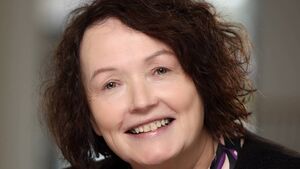Kildare-based CEO advocates for pay parity in early years sector

CEO Early Childhood Ireland, Teresa Heeney
Early childhood education targets learning in a child’s formative years, and is known to have a significant impact on the physical, cognitive, social, and emotional growth of children.
CEO of Early Childhood Ireland (ECI), Teresa Heeney, who is based in Maynooth since 2001, has huge expertise in this area and is an advocate for changing the public perception of early childhood education for the promotion of gender equality and improved pay and parental leave in the sector.
Teresa has worked in Early Childhood Ireland for many years and has CEO since 2014.
Throughout this time, she has seen the significant expansion in the provision of creches, services and preschools across the country, drawing particular attention to the Early Childhood Care and Education Scheme, describing it as a “very significant change” for the sector.
She continued: “Most of the state’s role in early childhood education had been in the provision of financial supports to families and after the introduction of the free preschool programme, they then began to provide universal supports for all children.”
While the industry have seen many welcome changes, some unfortunate conditions remain.
Teresa explained: “We've seen growth and improvement in many things, but the key difference between how the early years is treated and how other educational sectors are treated is around the paying conditions of the workforce. And that's where it becomes gendered.
“Our workforce is 97 to 98 per cent female, and there’s 30,000 in our workforce. We are driven by a goal that sees the early years system being properly funded and that recognises the importance of the workforce and the work that they do.”
Teresa and ECI wish to bridge the pay gap between the early years sector other parts of the education system.
“We know that our workforce doesn't enjoy pay parity. Their terms and conditions are not only not equal when it comes to pay, a lot of them don't enjoy pension contributions, a lot of them don't enjoy additional maternity leave contributions, and is that because it's a highly gendered workforce? I think it's reasonable to assume that that is a contributing factor."
Teresa explained that for a role that requires a college qualification, employees in the sector can be paid barely above the minimum wage.
“The last government achieved a spend on early years of over €1.3 billion, and we're saying that over the lifetime of this government, we have to be setting a target that probably looks at least double that in the lifetime of this next government.”
“Early Childhood Ireland has asked the Irish public about this and overwhelmingly agree that people who work in early years who have the same qualification as primary school teachers should enjoy the same terms and conditions. It gives resonance to the fact that the work of that person is as important as the work of somebody who's working with children over the age of five.”
Teresa credited the 169 “fantastic” Kildare members of ECI for their work, but notes that due to these “structural issues” it is challenging for them to be running at the capacity in demand.
She explained: “There's only one way to resolve it, and that is with additional investment. Parents can't pay anymore. Operators can't pay anymore. It is about state investment and putting value into that.
“We hear from members, including from Kildare, every day that they would be happy to expand. Many of them don't even operate waiting lists anymore because they can't promise parents anything. They describe not being prepared to expand because of the stress and how challenging it is to recruit and retain staff.”
All that being said, Teresa wholeheartedly believes that a career in the sector is of value.
“There are so many fantastic examples of why it's worthwhile to work in this world. But equally, we know what the problems are and you can't hide behind that either.”




